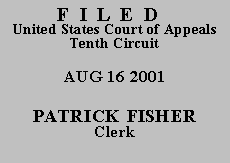

| BENNIE L. PLUNKETT, JR., |
|
In 1995, Mr. Plunkett was convicted of three counts of aggravated criminal sodomy and two counts of rape. Doc. 8, at 3. The state court sentenced Mr. Plunkett to an overall term of imprisonment of thirty years to life. Id. The Kansas Supreme Court affirmed Mr. Plunkett's convictions on direct appeal. State v. Plunkett, 934 P.2d 113 (Kan. 1997). In 1998, Mr. Plunkett filed the instant habeas petition in federal district court alleging a single ground for relief: that the trial court had erroneously terminated his right to represent himself in violation of the Sixth Amendment. Doc. 1, at 4. The district court denied Mr. Plunkett's petition on the merits, Doc. 14, at 7, and denied Mr. Plunkett's application for a COA. Doc. 17, at 2.
On appeal, Mr. Plunkett reasserts his alleged Sixth Amendment violation. In his brief, he also raises claims of prosecutorial misconduct, trial court bias, ineffective assistance of counsel, and that the trial court erred in ruling on his petition without a complete set of trial transcripts. See Aplt. Br. Attach. Because Mr. Plunkett did not raise his claims of prosecutorial misconduct, trial court bias, and ineffective assistance of counsel in his habeas petition for consideration by the district court, we decline to consider those claims here. See In re Walker, 959 F.2d 894, 896 (10th Cir. 1992). As for Mr. Plunkett's contention that the district court committed error by denying Mr. Plunkett's petition without reviewing the entire set of trial transcripts, see Doc. 14, at 1 n.1, we disagree. The district court relied on the transcript of Mr. Plunkett's pretrial hearing during which the relevant events occurred (i.e., the state trial court found Mr. Plunkett incapable of representing himself). Id. at 2-5. Mr. Plunkett does not contest the facts leading to this appeal, and he also has not shown how the lost trial transcripts have prejudiced this appeal. See Capps v. Cowley, 63 F.3d 982, 984 (10th Cir. 1995). Therefore, we hold that the district court did not err in denying Mr. Plunkett's habeas petition without reviewing an entire set of trial transcripts.
Addressing the one issue that Mr. Plunkett did raise in his habeas petition, that his Sixth Amendment rights were violated by the state trial court's refusal to let him represent himself, we agree with the district court that Petitioner has failed to show that the state court's decision "was contrary to, or involved an unreasonable application of, clearly established Federal law, as determined by the Supreme Court of the United States," 28 U.S.C. § 2254(d)(1), Williams v. Taylor, 529 U.S. 362, 412-413 (2000), or "was based on an unreasonable determination of the facts in light of the evidence presented in the State court proceeding," § 2254(d)(2). On appeal, Mr. Plunkett has failed to show that "reasonable jurists could debate whether . . . the petition should have been resolved in a different manner." Slack v. McDaniel, 529 U.S. 473, 484 (2000).
Therefore, we DENY Mr. Plunkett's request for a COA and dismiss the appeal.
Entered for the Court
Paul J. Kelly, Jr.
Circuit Judge
*. This order and judgment is not binding precedent, except under the doctrines of law of the case, res judicata, and collateral estoppel. This court generally disfavors the citation of orders and judgments; nevertheless, an order and judgment may be cited under the terms and conditions of 10th Cir. R. 36.3.
**. After examining the briefs and the appellate record, this three-judge panel has determined unanimously that oral argument would not be of material assistance in the determination of this appeal. See Fed. R. App. P. 34(a); 10th Cir. R. 34.1 (G). The cause is therefore ordered submitted without oral argument.